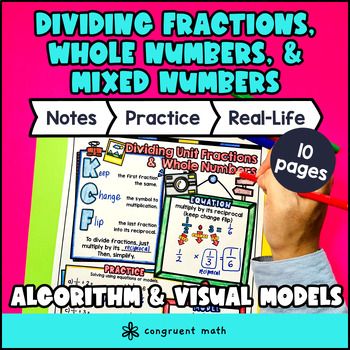Want more ideas and freebies?
Get my free resource library with digital & print activities—plus tips over email.
Join for Free Resources →
$4.25
Ever wondered how to teach dividing fractions in an engaging way to your 5th and 6th-grade students?
In this lesson plan, students will learn about dividing fractions by whole numbers, unit fractions, regular fractions, and mixed numbers. Through artistic, interactive guided notes, check for understanding, a color-by-number activity, and a maze worksheet, students will gain a comprehensive understanding of fraction division.
The lesson concludes with a real-life example that explores how dividing fractions applies to everyday situations, helping students see the value of this math skill beyond the classroom.

$4.25
After this lesson, students will be able to:
Before this lesson, students should be familiar with:
As a hook, ask students why it might be useful to know how to divide fractions by whole numbers or mixed numbers in everyday life. For example, have they ever tried to share a recipe or divide up something like pizza or candy among friends? Refer to the real-life application page at the end of the guided notes to inspire this discussion and help students see the relevance of the skill beyond the classroom.
Use the first page of the guided notes to introduce the concept of dividing fractions by whole numbers and unit fractions. Walk through how division of fractions works, emphasizing the visual fraction models alongside the equations to help students understand why dividing by a whole number is equivalent to multiplying by its reciprocal. Point out and work through each example and the checks for understanding to verify students can explain the procedure and solve basic problems. Refer to the FAQ below for detailed walkthroughs and ways to address common misconceptions, such as confusing multiplication and division or incorrectly flipping mixed numbers.
Use the second page of the guided notes to introduce dividing fractions by mixed numbers and non-unit fractions. For mixed numbers, carefully explain converting mixed numbers to improper fractions as a prerequisite step, then demonstrate the division process. Highlight the step-by-step procedure, including when and why to multiply by the reciprocal and how to simplify results. Use the guided checks for understanding to assess comprehension and guide discussion. Refer to the FAQ section for strategies to clarify these more complex steps and for responding to frequent student questions about mixed numbers.
Based on student responses during these guided notes and checks for understanding, reteach any concepts that students need extra help with. If your class has a wide range of proficiency levels, consider pulling small groups for targeted reteaching while having more advanced students begin working on the practice exercises independently. This approach helps ensure all students build solid understanding before moving forward.
Have students practice dividing fractions by whole numbers and mixed numbers using the maze activities (page 4) included in the resource. Walk around to answer student questions.
Fast finishers can start the color by number activity (page 5) for extra practice. You can assign it as homework for the remainder of the class.
Bring the class back together, and introduce the concept of using fraction division to solve real-world problems involving sharing, cooking, and measurement. For example, discuss how dividing a recipe into smaller portions requires dividing fractions by whole numbers or mixed numbers, or how dividing lengths in construction projects can involve dividing fractions. Refer to the FAQ for more ideas on how to teach it!
If you’re looking for digital practice for dividing fractions, try my Pixel Art activities in Google Sheets. Every answer is automatically checked, and correct answers unlock parts of a mystery picture. It’s incredibly fun, and a powerful tool for differentiation.
Here’s 3 activities to explore:
Dividing fractions by whole numbers means finding how many times the whole number fits into the fraction. It can also be seen as splitting the fraction into smaller equal parts based on the whole number.
To divide a fraction by a whole number using a visual model, you can represent the fraction as a shape divided into equal parts, then split each part into the number of whole number sections.
When dividing a fraction by a whole number, multiply the denominator of the fraction by that whole number.
To divide fractions by mixed numbers, first convert the mixed number to an improper fraction, then multiply the first fraction by the reciprocal of that improper fraction.
Multiplying by the reciprocal in fraction division works because division is the inverse operation of multiplication.
Yes, dividing fractions by unit fractions is done by multiplying the fraction by the reciprocal of the unit fraction.
Real-life applications provide context to fraction division, making it easier to understand and relate.
To check your answer for dividing fractions, multiply your quotient by the divisor to see if you get the original dividend.
Get my free resource library with digital & print activities—plus tips over email.
Join for Free Resources →